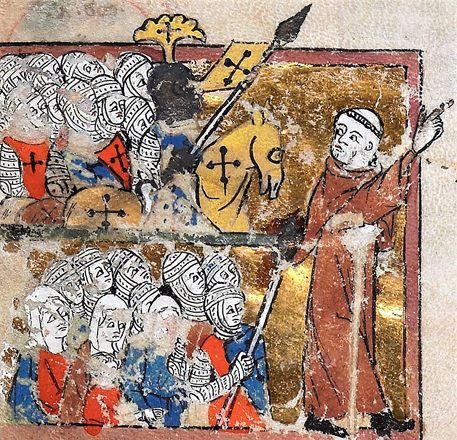You are here
Letters from Syrian orator indicate presence of Arabs in Levant ‘ earlier than previously thought’ — scholar
By Saeb Rawashdeh - Mar 04,2019 - Last updated at Mar 21,2019

Pawel Filipczak
AMMAN — Letters written by Libanius, a teacher of rhetoric who lived in 313-393AD, addressed to the governors of Arabia, prove the presence of Arabs in Antioch on the Orontes, the biggest city in Syro-Palestine, long before the 7th century AD, according to a Polish historian.
While scholars have no evidence of mass migrations of Arabs from the desert to Roman provinces in Late Antiquity, Assistant Professor at the University of Lodz in Poland Pawel Filipczak said Libanius’ letters indicate the presence of Arabs in the Levant earlier than previously thought.
Filipczak’s scholarly interests concentrate on the history of the late Roman Empire, mainly on the history of urban communities, especially those inhabiting Antioch on the Orontes, as well as on the imperial administration in Syria and the historical geography of the Middle East in the Roman period.
For his research, he relied on accurate philological and historical commentary of Greek (or Latin) speaking sources, mainly narrative texts like letters, speeches, histories, chronicles and less frequently, inscriptions.
Libanius was born in Antioch, spending his childhood and most of his adult life in his native city, the historian said, adding that he taught the art of rhetoric; and initially worked as a private tutor, later holding the chair of rhetoric in the city of Antioch.
“His literary output is enormously impressive. It includes, among others, 64 orations and 1,544 letters,” Filipczak stressed, underlying that the spectrum of issues covered in the orations and letters was broad and encompassed almost all aspects of life in Antioch and the region, including its social history.
Libanius was never terribly interested in the matters of ethnicity, however Filipczak found, (mainly in 25 letters to the governors of Arabia), numerous snippets of information relevant to the study of Arabs in Late Antiquity.
He elaborated: “It is difficult to say, regarding 4th century, about ‘classes’ in a modern sense of this word. Libanius is a representative of provincial, well-educated and wealthy elites of the empire.”
Hellenised Arabs and urban life
According to the scholar, there were two types of Arabs in Late Antiquity, (though the definition of the word “Arab” is far more complicated), which included those who settled in cities, like Petra, and those who lived in the desert as nomads.
“The bulk of the elites — intellectuals, rhetors [those who teach rhetoric], lawyers, politicians, bishops and businesmen — used Greek, which was the most widely spoken language [Latin was used only by imperial officials]. So, if we speak about Hellenisation of the Arabs, we speak, in the vast majority of the cases, about Arabic elites,” Filipczak said.
“All over the Roman world — and Arabia was no exemption here — it was a well known phenomenon that Romanisation, or Hellenisation, was accepted by inhabitants of towns and cities,” Filipczak explained, adding that the countryside always served as a refuge for local traditions.
“In my opinion, only wealthy Arabs from Bostra, Petra, Gerasa etc. had money to pay for a classical Greek education — for studying rhetoric or philosophy with famous professors,” the historian pointed out.
Most of the information he found concerned two groups — students and teachers, he continued, adding that they came from Arabia to the school run by Libanius to study rhetoric, or later, to work as professors.
“How many of them stayed at the school of Libanius? We know in total a dozen or so names which meant that they weren’t the dominant group of Libanius’ students and co-workers. We are sure of the presence of Arab merchants in Antioch, but we have no further details about them. It is also possible that Arab musicians were a permanent fixture on the streets of Antioch,” Filipczak underlined.
Furthermore, as Antioch was the capital of the province, delegations of distinguished citizens from the different cities of Syria might have come there seeking support for different matters as the governors resided in Antioch, the scholar said.
Researchers cannot find a trace of ethnic bias in Libanus writings because both Arab and non-Arab students belonged to the same cultural milieu, Filipczak highlighted, although, Libanius regarded Arabia as a tough province, “particularly owing to social unrest caused by the rebellious population to which Libanius once referred to as ‘barbarians’”.
Writing about barbarians, Libanius had in mind the struggles with Arab nomads or with turbulent Arab inhabitants of some cities, the scholar said.
However, “Libanius had a realistic and unbiased approach to people, irrespective of their province of origin,” Filipczak underscored.
Related Articles
AMMAN — Kerbogha mobilised a coalition of heterogenous Muslim emirs from Jazira in order to meet crusaders at Antioch.
AMMAN — It is not clear whether Pella, 130km northwest of Amman, was utterly destroyed by the Hasmonean ruler Alexander Jannaeus or if it wa
AMMAN — One of the first major campaigns of the First Crusade was the siege of Antioch in spring of 1098.


















